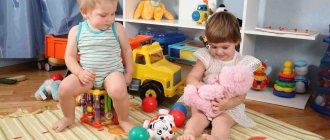A person’s personality, according to many psychologists, is formed in the first years of life. That is why it is so important when raising a child from 1 year of age, during active growth and rapid development, that the baby receives the experience necessary for his future life, which will become the basis for his future life.
Therefore, mothers and fathers, especially young ones who have virtually no experience in raising children, need to learn to be parents, obtaining the necessary knowledge about the psychological and physiological characteristics of the baby’s development.
Can't live without movement
Young children are little spirits who cannot remain motionless for a long time, in a state of immobility. It seems that everyone knows this, but few people articulate it. And few people connect it with real life. Everyone knows: it is difficult for a child to sit without moving. At the same time, he should sit calmly in a car stuck in a traffic jam and not yell; and in line at the supermarket he must sit quietly; in the clinic you should not move at all if you suddenly went to the clinic; and at the family table, of course.
But in reality, children get very tired when they cannot change their position. (To “try on” this feeling for yourself, an adult can imagine himself on a train, on a hot, uncomfortable third shelf, in the summer, with the windows not opening and the stove burning.) The baby is very uncomfortable. And he cannot comprehend this physical state and translate it into words - so he begins to yell. In general, up to a certain age, everything that a child cannot translate into words causes a cry.
A scream is a manifestation of the first signaling system (remember, according to Pavlov - they taught it at school?). And the second signaling system is speech, words, something that only humans have and what distinguishes them from animals. Until about three and a half years of age, a child has the opportunity to use the second signaling system, i.e. speech is very, very limited , even if he already speaks.
Yes, he speaks, he can say a phrase, ask about something, tell something. But now he is tired, overexcited, hungry, out of routine - under all these conditions the child becomes, as it were, younger than his age. Temporary regression occurs, and the baby moves on to the previous stage, i.e. he starts yelling instead of talking. This also happens to adults, to women, for example, at a time of physical or moral overload. There comes a time when you do not speak, but only make sounds at increased volume. Only in a child this happens much more often and very strongly.
Story-based games as the basis for raising young children
In addition to games with didactic material, it is necessary to pay attention to story-based games. To act out everyday situations, you can use dolls and animal toys. To begin with, it is better to use simple and understandable plots for a child of this age, which gradually need to be complicated with various situations and details.
At first glance, adults with rational thinking may find these games boring and not useful for the development and upbringing of a child aged 1.5 years and older. However, it is precisely these games that need to be given a lot of time, since they enrich the baby’s experience and teach him to live through, at first glance, insignificant situations. You can start with successive moments that occur in the baby’s life - feeding, walking, bathing, playing, going to bed, which will help to understand the relationship between these actions in his own life.
At the same time, story-based games provide many opportunities for the manifestation of imagination and fantasy, which is the basis for the development of a child’s intellectual abilities. In addition, through story-based play, the child’s ideas about reality - about clothes, furniture or dishes - are consolidated. For variety, you can introduce pictures of birds and animals into the game, which will increase cognitive interest.
Video from YouTube on the topic of the article:
Language of emotions
In general, small children, even those who can speak, do not speak in words, but in the language of behavior and the language of their emotional states . Those. A child’s behavior, even the most bad and unpleasant behavior for you, even terrible behavior in public, including screaming, must first of all be treated as a language. This is a language without words, and parents should learn to understand: what does the child want to tell them with this cry?
But parents are also living people, and the cry of a child, especially his own, especially in public, involves a very strong primary reaction in the parents. This reaction consists of the desire to remove the source of sound by any means. Here everyone forgets about educational guidelines, about what they read in books, listened to in lectures, what they promised themselves before. The reaction to a scream is primary, coming from the depths. Shut up and that's it.
One might say that this reaction is immature. If you don’t learn to somehow extinguish it in yourself, to slow it down, then you won’t be able to overcome the scream. A child is yelling or being capricious—behaving badly. Mom gets angry and also yells - and this is a vicious circle that an adult must break.
Bad behavior - mom
Those who stay with your child without you vying with each other to tell how well he behaves - with his grandmother, with the nanny, even with his father. How interesting it is to be with him and how flexible he is. But then the mother comes - and the child is like a punishment. Sound familiar?
It's not a matter of poor upbringing. The fact is that the strongest love is for mother and, accordingly, its reverse side is the main emotional claims. And it doesn’t matter what kind of mother you are. You can be a supermom and not make any mistakes at all. This, of course, does not happen, but still. The cream of bad behavior goes to mom . This is simply a rule arising from the characteristics of a child’s existence. And the mother must endure all this. You don’t have to think that it’s better for me to go to work or stay somewhere, and the child will behave better, there will be fewer tantrums. No. The point of development is to hone all this about your mother: both will and hysterics. Mom just needs to be patient and learn to react correctly.
Psychology of raising a child from 1 year to 2 years
A very important period in children’s lives; father and mother should encourage impulses towards independence. Don't forget about fostering cultural awareness and spending time together, such as playing games.
What should be taught between the ages of 1 and 2 years:
- Teach children to clean their own body and hygiene, remind them that before sitting at the table, they need to wash their hands with soap. In the morning, the baby must wash himself and even brush his teeth, to teach this, set an example.
- Getting dressed is the second important point, teach your child to put on socks, a hat and tights on his own so that such a desire appears, tell your son or daughter that they are beautiful and you love them very much. Love is a powerful tool.
- Independent food from a spoon - in order to teach your child to eat independently, you need to interest him, the best option is to buy a beautiful spoon with cartoon characters.
- General daily routine! At 9 o'clock the baby should sleep, eat at the allotted time, and after lunch go back to bed - daytime sleep is mandatory for the growing body.
Love your child, do the right thing, give him a lot of time and care, because all moments are unique and unforgettable in their own way.
Mom reacts
The difficulty is that the mother does not develop the correct reaction suddenly - just as many cannot learn to give birth well the first time. The correct reaction requires training and improvement. It's easier to say what the wrong reaction looks like. If you feel that you are on the same level as your child, you feel that you are seriously beginning to resist him - this is a reaction on the same level. He says: “I won’t leave the puddle!” - you say: “You will go out of a puddle!”, and again the same thing... This is an immature reaction - seriously. If you have stepped off your parental pedestal and descended to the level of a serious dispute over whether the child will put away the cubes or not, then your reaction is immature.
Your reaction can be as hard or soft as you like, but it should always be a little on top. You must understand who you are dealing with. But for a mother, staying at home with a child of primary preschool age and the lack of adult communication seriously changes the scale. And dad, returning in the evening, may find serious bickering over some issue such as cubes or pajamas. Provoked all day, mother begins to be stubborn about all these reasons in the evening.
You have to learn not to lose scale. Compared to the world revolution, it doesn’t matter what kind of pajamas you wear. If you seriously start to get angry, then it is better to try to move away or withdraw your demand. And this does not mean that you follow the child’s lead. Remember: this is a small child who is not responsible for himself, although it seems that his behavior is malicious, purposeful, specifically against you.
And a child under seven years old is actually not responsible for himself. Although the degree of non-response is one for a two-year-old, it is different for a five-year-old. A two-year-old is not responsible for himself at all; a five-year-old can already demand something. But overall, you are still responsible for everything. It's hard. Therefore, you should have five to seven ways in your arsenal to “resolve” the regime situation - force them to remove, for example, the cubes. Methods that you no longer think about, proven, effective - because the child will have difficulties with all the routine moments until they are mastered, and up to three years of age this is completely normal.
The simplest thing is a system of rewards for the child. (Punishments don't work, and if they do work, they don't work for very long. Spanking and yelling are generally not good.) For example, the child needs to know that when he completes the blocks, you will do something nice. An action that requires tension (and clearing blocks is an action that requires tension) must be followed by something that brings obvious pleasure. Except for candies and cartoons. If this is the only incentive in your arsenal, then it is very little.
How not to break down?
Usually the mother reacts incorrectly, immaturely to the children's whims in a state of fatigue and lack of sleep. When you have not drunk enough liquid and your mother is breastfeeding. When I ate for a long time. When I haven’t communicated with other adults for a long time. (It happens that by the end of the second year, a mother stops communicating with adults almost completely, goes to this level: “mine is yours, go away, turn it on, kaka, bye-bye.” And even a spouse who comes home from work can find it difficult to get her out of communication in the mumba-yumba language.)
How to avoid this? Firstly, try not to expose yourself to such overloads - attract someone else to sit with the child: it will be more beneficial for him, for the mother, and for family relationships. Secondly, learn to observe the signs of impending irritation and take action.
As soon as you notice that you are about to lose your temper, you make a break, move away from the child and try to switch yourself. Let him sit in a puddle, let him do whatever he wants, as long as it’s not life-threatening - you need to get out of the situation. Deep breathing helps. It helps just as well to call your girlfriend on your cell phone and tell her what’s going on with you. If it's happening at home, it's good to eat something. The seeds help outside. Some people think no less than a hundred. Roll a rainbow ball. You should have three or four ways.
As soon as you switch off (try to really switch off), the child’s reaction changes. As soon as he saw that his mother, instead of tormenting him, switched off, there is a chance that he would stop his behavior. And if you manage to breathe and calm down, you have a chance to figure out how to switch the child.
It must be remembered that an irritated teacher does not educate, but irritates. Everyone thinks that they can educate in any condition, even when they are yelling, but in reality there is nothing like that. You are only letting off steam, but there is no benefit from it. And a child can be raised only when he is balanced, and you can do this yourself if you are in a state close to calm. In an irritated state, don’t even think about educating. You only need to think about how to calm yourself down and how to try to get the child out of the wedge.
And a little more about physical activity
Lack of physical activity in young children has a negative impact on overall behavior and quality of sleep. If a child does not expend his physical strength, i.e. does not walk and move enough, this manifests itself as nervous excitement, the quality of the child’s wakefulness and quality of sleep suffers. It is ideal to walk twice for one and a half to two hours. Poor behavior in active little boys is usually a consequence of lack of exercise.
But with fatigue - whether physical or emotional - in children of the second or third year of life, the coordination of movements greatly deteriorates . When overtired, a child not only stops speaking, but also begins to move, like a baby six months to a year younger.
conclusions
The first three years of a child’s life are the age at which the child has not yet realized himself as an individual and acts largely unconsciously. However, it is at this age that personality begins to form, and the actions of adults will largely determine how the baby will grow up.
Surround your child with love and respect in order to give him the most important things for harmonious development. Try to keep a balance between a variety of activities and overstimulating the child with an excessive number of toys and decor. Remember that the most important thing is not things and sets, but your relationship with your baby and his inclusion in the life of the family. It is respect and recognition of the child as an equal member of the family that dictates all other rules of Montessori education.











